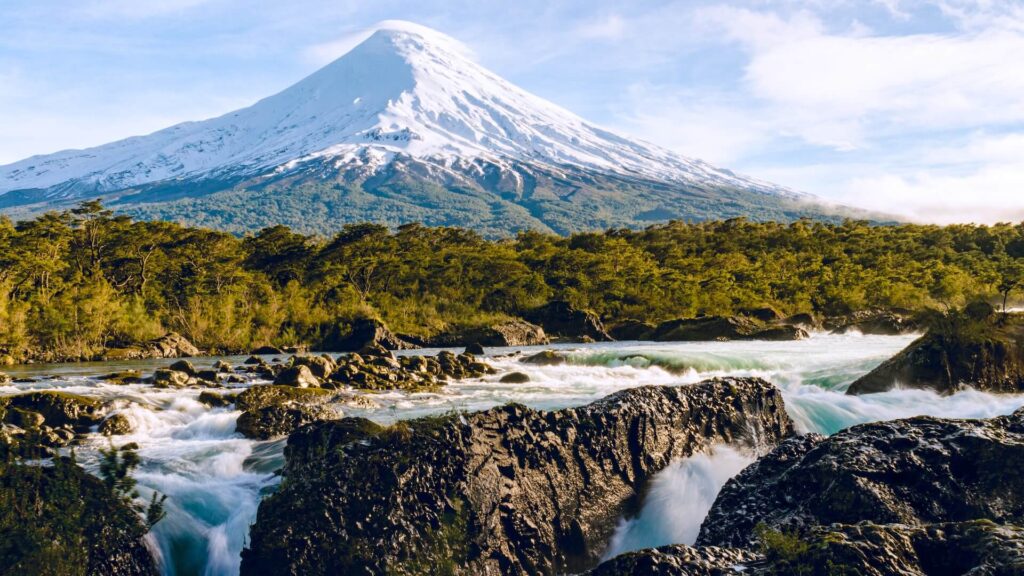Updated on December 22, 2023 by Lou Mac
There’s no doubt that Chile is an incredible travel destination.
It’s home to everything from the world’s driest desert in the North to world-famous hikes in the South. It’s full of delicious food and friendly people.
And while you’re sure to have a great time, there are definitely a few things you need to know before you arrive.
In this post, we’ll go over 20 things that I wish I knew before my travels to Chile—things that will make your trip a lot easier!

1. Travel in Chile is not as cheap as you’re expecting
I think a lot of people have the impression that their dollars will go further in Chile. And while this is true to an extent, it’s not as cheap as you might assume!
Of course it’s relative and depends on what you’re used to, but here are my observations (coming from New Zealand):
- Groceries: Similar price
- Alcohol: Much cheaper
- Traveller accommodation: Depends on where you stay, but hostels are definitely cheaper
- Rent: Cheaper
- Clothes: Similar price
- Electronics: More expensive
- Cars: More expensive (like, double the price!)
2. Tipping 10% is usually the norm
If you don’t come from somewhere where tipping is the norm (like me), then this tip 😉 is aimed at you.
In restaurants, bars, cafés and other eateries in Chile, it’s usually expected that you leave a 10% tip if the service was satisfactory.
It should be clearly stated on your bill, and your waiter will usually ask you if you wish to leave one—but don’t feel pressured to do so if you didn’t think your experience was worth it!

3. Chileans do everything a lot later
One thing I was not expecting when I came to travel Chile was how late everything is here.
Maybe you’re from a country with similar routines to Chile, but for me coming from New Zealand it’s taken a lot of adjusting.
Where in New Zealand I would usually meet my friends around 6:30-7pm for dinner, here in Chile people might arrange to meet more like 8-9pm. So if you pop out for dinner in Santiago and wonder why your restaurant is so quiet, it’s probably because you’re too early!
Going out drinking is the same thing: Pre-drinks start around the time I would usually head out to town in New Zealand, and the clubs here in Chile don’t get good until after 1am.
4. Chilean Spanish is unique and often unintelligible for travellers
If you’re been learning Spanish, you may already know that Chilean Spanish is notoriously the most difficult of all the Spanish dialects.
Chileans speak very quickly, don’t enunciate properly (sorry Chileans, but it’s true), cut the ends off their words and use so much slang that it sometimes seems like another language.
In saying this, you should be able to get by if you know the basics of Spanish and ask for people to speak slowly.
If you don’t know any Spanish yet, now’s the time to start learning! Check out my free guidebook for beginners for help getting started. You could also hit up the old faithful Duolingo.

5. Bread in Chile is delicious
One thing I didn’t expect when I came here was how great the bread is.
Where I’m from, supermarkets usually sell packaged loaves of bread from other suppliers. But in Chile supermarkets usually make their bread fresh throughout the day!
But it’s both a blessing and a curse, as it’s easy to eat an awful lot of it.
Make sure you try the marraquetas, the most common (and delicious) type of bread here.
6. You might struggle a little to travel Chile as a vegetarian
Meat is a staple part of the Chilean diet, and Chileans eat it with most meals.
Vegetarianism/veganism is definitely on the rise here, and there are tons more options now than there were just a couple of years ago. The lifestyle is also much more popular among friends and family.
However, if you venture out of Santiago and the other main cities it may be tough to find suitable meals at times—just something to keep in mind when you’re planning your trip.
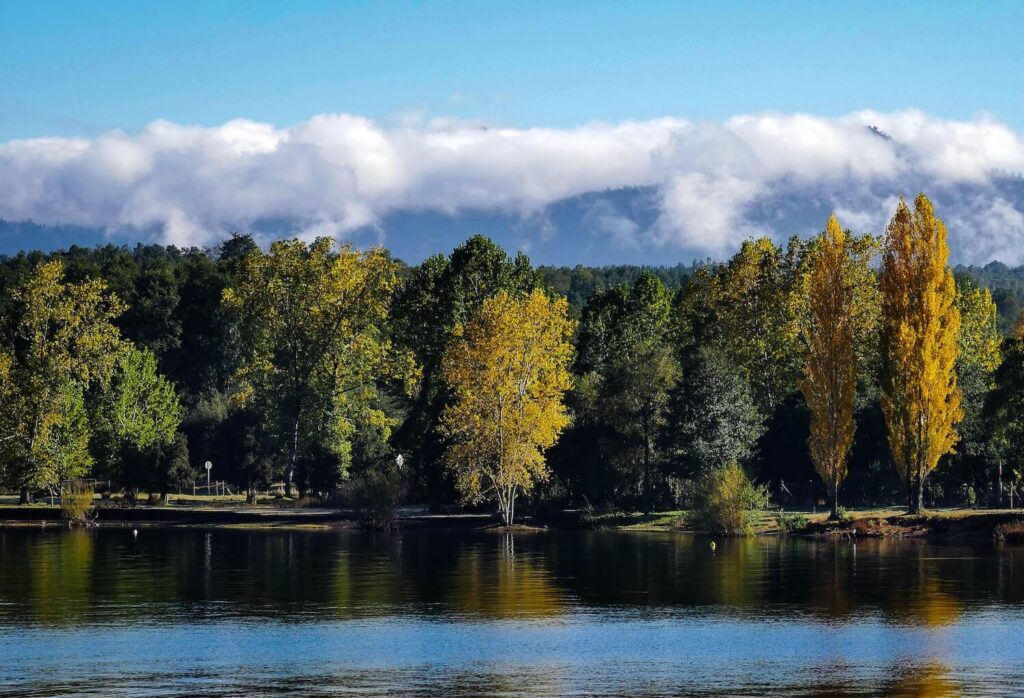
7. Chile has eighteen public holidays, and it pays to know when they are
You know that feeling when you realise too late that it’s a public holiday, and you’ve missed your chance to go to the supermarket?
Not only could you be stuck without food if this happens in Chile, but sometimes restaurants don’t open, public transport doesn’t run at full capacity (or at all), attractions are closed and traffic on major routes is bumper to bumper.
Chile has a whopping eighteen public holidays and you need to be aware of the dates if you’re travelling here.
Here you can find a list of the public holiday (feriado) dates for 2024 (note: they’re in Spanish, but they don’t take too long to decipher!).
8. You should always carry toilet paper in Chile
Toilet paper is one of those things that you never think about until you need it and there is none.
In Chile, it’s extremely common to find yourself in a public toilet, bar, event or other situation where the toilet paper has been used down to the cardboard roll.
To avoid a potential tragedy, I strongly suggest that you invest in a packet of tissues and carry them around during your stay in Chile. If there were only one tip you remember from this post, let it be this one!

9. In Chile, toilet paper usually gets put into a bin, not the toilet
While we’re on the topic of toileting, you should also know that toilet paper very often gets put into a bin instead of into the toilet. This is true of Chile and many countries in South America in general.
Even if using the bin might not be your first choice, please be respectful—a lot of the wastewater systems aren’t able to handle a whole lot of toilet paper.
So if you see a bin next to the toilet, take it as a sign to use it!
Inside people’s homes it can go either way. The main thing to remember there is to close the door once you’re done in the bathroom.
10. Be prepared with Chilean pesos in cash
While card payments are being accepted more and more, there are still plenty of situations where you’ll need to pay with cash in Chile. Especially in smaller towns or when visiting smaller businesses, it always pays to carry cash on you!
Of course you don’t want to go out with large amounts of cash, so I’d recommend taking just what you need and leaving the rest in your accommodation.
Also, getting change can sometimes be a problem—ensure that you carry smaller bills and coins as well as your larger bills.

11. Distances in Chile are long and overnight bus travel is supreme
Chile is one of the longest countries in the world, and you may be surprised how long it takes to get from one place to another. Luckily, intercity bus travel is very well developed and is fully utilised by the locals.
Buses are plenty and also very comfortable. The seats are almost always large and soft, with some buses even having seats which lie at 180 degrees!
In my opinion, catching an overnight bus to travel Chile is the best way to go. Bring an eye mask and ear plugs to ensure you get a decent amount of sleep, and bam, you wake up and you’re there!
It’s also a great idea to download some series or movies before you head off ( you’ll thank me later).
Just remember to be vigilant with your belongings—they are public buses, after all.
12. Some places in Chile are safer than others
As with any other country in the world, there are places in Chile that aren’t exactly safe for tourists.
You can generally assume that bigger cities are more dangerous than sleepy countryside towns, but make sure you do your own research before you go—know which neighbourhoods are the safest and which you should avoid.
In Santiago, for example, you need to be pretty vigilant in most areas, especially in neighbourhoods like Bellavista at night.
I would also recommend that you look for up to date information around specific tourist areas. Thieves often target tourists, and lots of tourist hotspots are also unfortunately pick pocketing hotspots.
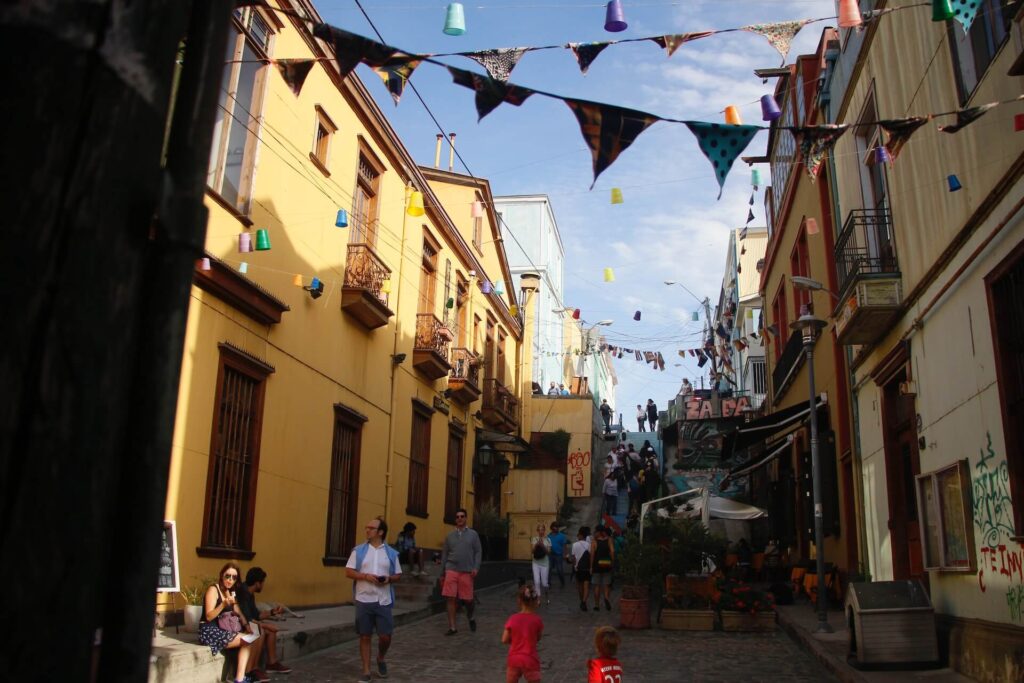
13. Keep an eye on your things at all times
Okay, maybe not at all times, but when you’re in public in Chile (everywhere apart from maybe in Patagonia) you need to be alert.
You can check out this post for an in-depth guide on safety in Chile, but here is an overview:
Don’t get your phone out in a big crowd or on busy streets, don’t store it in your back pocket and don’t leave it on the table next to you while you’re eating.
If possible, you should wear a cross body bag (instead of a bag that sits over one shoulder), and keep it in front of you instead of behind you (I got pick pocketed this way in Spain, and ever since I’ve worn my bag in front!).
Train stations and bus stations can be really bad for thieves, who work in pairs to distract you while the other robs you: My friend almost got robbed this way at a bus terminal in Santiago, but luckily a local alerted her and the pair ran off.
14. Only go out with the essentials
In the same vein, don’t take all your valuables out and about with you. This is what you should do when travelling anywhere in the world anyway.
Chances are you will be completely fine, but why leave it up to chance?
If you don’t need your expensive camera with you, leave it in your accommodation. If you don’t need your wallet with your driver’s licence, spare bank card and extra cash, don’t bring it.
I learned this the hard way—I had my driver’s licence and spare cards stolen in a nightclub in Buenos Aires, when I actually had zero use for them that night. I just took them out of habit.
Don’t be like me!

15. Be prepared for Chilean land border crossings
It’s not uncommon to see long wait times leaving and entering through land borders, though it’s usually better earlier in the morning.
You also need to be prepared: have ready your passport, visa information, intended address in Chile (or Argentina/Bolivia/Perú), and, if you’re travelling in your own car, all the necessary documentation.
If you are granted the three month tourist visa on entry, make sure you keep your visa receipt—a little slip of paper they give you on entry, pictured below—or there will be trouble when you try to leave (again, I know this from experience 😅).
Lastly, try to learn basic Spanish because the customs officers won’t always speak English, and aren’t always very friendly. We did, however, get some extremely nice customs officers in both Argentina and Chile while crossing at the Mamuil Malal International Pass.
16. Use rideshare apps like Uber instead of taxis
I probably wouldn’t have known this tip if it weren’t for my Chilean partner.
Taxis are supposedly not always trustworthy, and it’s much safer to use a rideshare app that can track your location and also keep tabs on the driver.
Rideshare apps are usually cheaper as well, not just because of the fees, but because taxi drivers are known to be a little scammy at times.
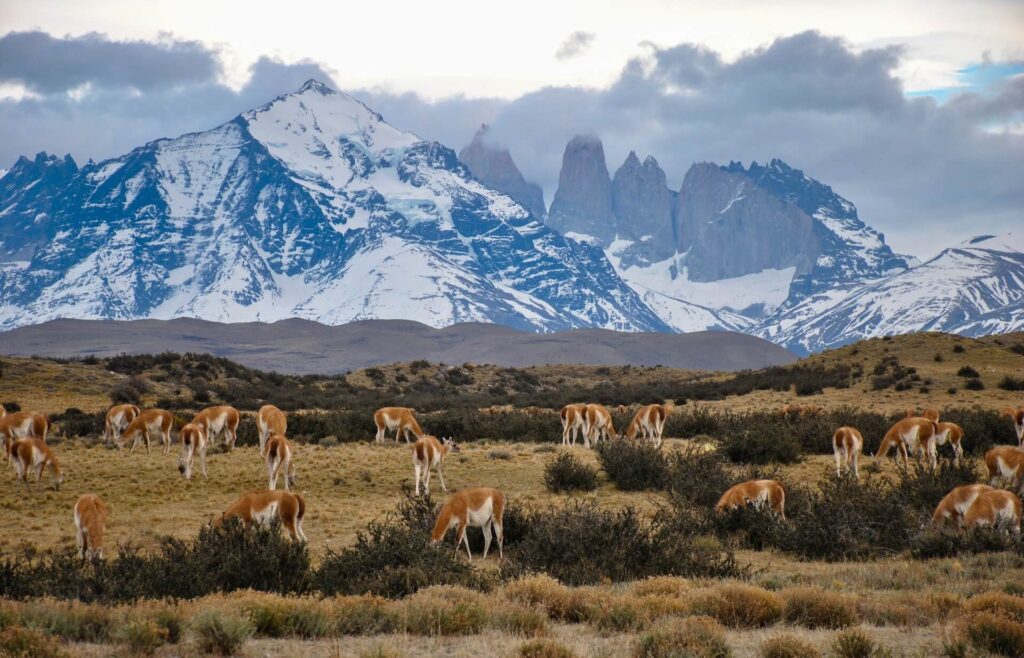
17. Book your overnight Torres del Paine trek well in advance
If you want to walk some of the famous overnight treks in Torres del Paine, you can’t just rock up on the day and expect to be able to walk it.
You usually need to book months in advance or you’ll risk not being able to do it, as there is limited space in the park with a lot of people wanting to stay.
The booking process can also be confusing, so have a read of this guide before trying it yourself.
If you just want to do day walks in the park however, there is no need to book!
18. You’ve gotta try traditional Chilean food
This might be obvious to some travellers, but not everyone is adventurous when it comes to food! If you don’t make an effort to try the local Chilean cuisine, you may leave with only having tried empanadas.
Chile has so much delicious food that isn’t actually easily accessible to tourists because a lot of it is cooked at home.
There are ways of getting around this: first, befriend some Chileans! If that fails, look out for specifically Chilean restaurants or restaurants advertising comida casera (homemade food).
You should also know exactly what you need to try. Below are some foods you should look out for, and here’s a full post on Chilean food if you’re interested:
- Empanadas chilenas
- Sopaipillas
- Completos
- Pastel de choclo
- Humitas
- Chorrillana
- Pisco (not a food, but still a must-try!)
- Pantrucas
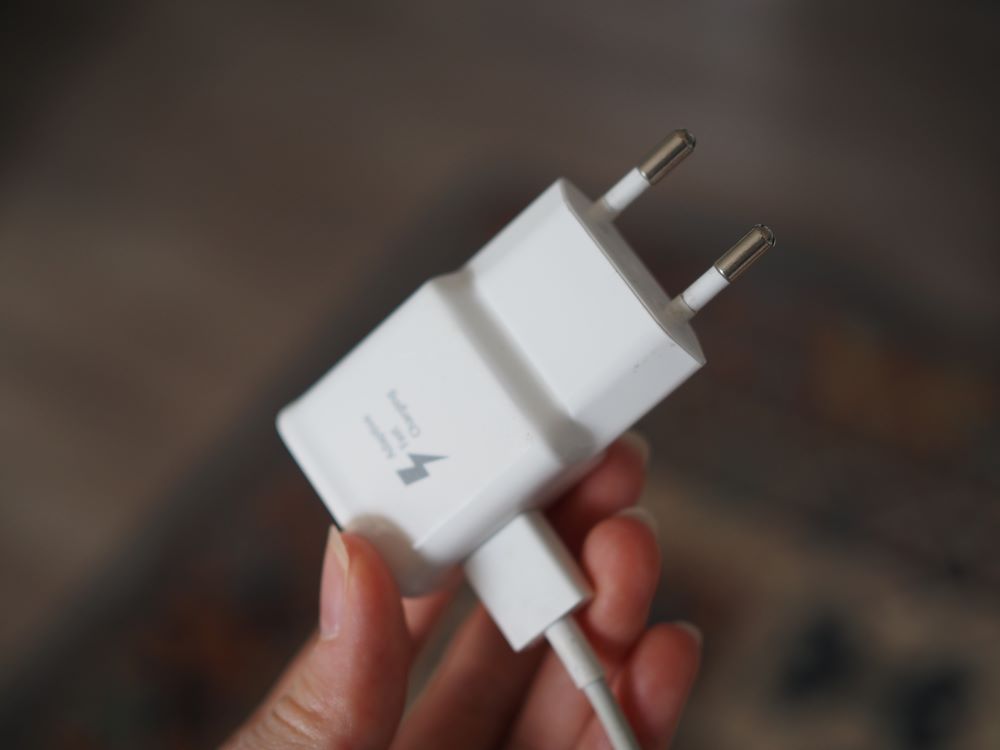
19. Bring an adaptor to travel Chile
Now this one really is obvious, and that’s because it is.
Chile uses type C plugs (which has two round pins) and type L plugs (which has three round pins), as pictured above.
So make sure you bring an adaptor for your plug if you don’t use the same kind of sockets in your country!
And just a side note—Argentina uses different plugs from Chile (though in some places you can get away with the type C plugs!) which are type I: three flat pins in a triangular pattern. If you’re from Australia or New Zealand, you can use your plugs there as usual.
20. Buy a Chilean SIM card – just don’t buy Claro
If your trip to Chile is more than a few days, it’s 100% worth buying a Chilean SIM card.
They cost about 2 to 2,500 CLP (around 3 USD or 4.50 NZD), plus the fee to top up, and then you can access the internet everywhere you go!
You can either buy SIM cards from the service provider or usually from corner stores and some kiosks. I recommend buying Entel as they have the best network quality, however WOM and Movistar are also fine (and slightly cheaper).
I do not recommend that you buy Claro, unless you want them calling you twice a day asking for you to buy different phone plans. And no, they do not stop calling even when you ask them to.
That concludes the main things you need to know before you head off for your Chile travel.
There are probably more things I could add, but we want a bit of surprise at least.
Good luck and enjoy!

